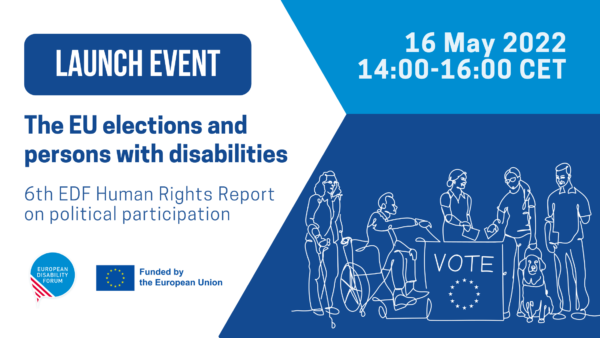Today the plenary of the European Parliament adopted a resolution including a proposal for a new EU Electoral Law. The proposed Electoral Law would be a great step forward concerning the political rights of persons with disabilities in the EU, because it ensures the right to vote of all EU citizens, regardless of their legal capacity, and sets out obligations for Member States to improve the accessibility of the European elections.
The Members of the European Parliament (MEPs) adopted by 323 votes in favour, 262 against, and 48 abstentions the legislative act agreed by the Constitutional Affairs Committee (AFCO). This will now be submitted to the Council as the final decision to change the EU electoral law from 1976 will ultimately be taken by Member States.
The text approved by the MEPs includes most of the European Disability Forum (EDF) proposals, namely:
Article 4 reads: “Every Union citizen from 16 years of age, including persons with disabilities regardless of their legal capacity, shall have the right to vote in elections to the European Parliament”.
Article 6 obliges Member States to ensure that people living in closed residential settings will be able to exercise their right to vote.
Article 7 on Accessibility sets out the following provisions:
- “1. Member States shall ensure that all citizens, including persons with disabilities, have equal access to relevant materials, to voting facilities, and to polling stations.
- 2. Based on their national voting systems, Member States shall put in place appropriate arrangements with the aim of facilitating the exercise of the right to vote by persons with disabilities independently and in secret.
- 3. Member States shall ensure that persons with disabilities receive, at their request, assistance in voting by a person of their choice.”
Additionally, articles 8 and 17 also set out accessibility obligations as for postal voting and the electoral campaigns respectively.
“With this report, the European Parliament shows its commitment to a stronger and more inclusive EU democracy. EDF will continue working with its European and national members to make this new Electoral Law a reality, and to ensure that all persons with disabilities enjoy the same political rights as any other citizen, including the right to vote and the right to stand as candidate”, said EDF President, Yannis Vardakastanis.
The only aspect in which the proposed Electoral Law falls short is in article 5 on the right to stand as candidate, in which, despite a positive reference in a recital, it does not explicitly guarantee the right to stand for office regardless of legal capacity status. In most EU countries this will keep preventing persons with intellectual and psychosocial disabilities from becoming political candidates.
Having a new EU Electoral Law in line with the UN Convention on the Rights of Persons with Disabilities will inevitably have a positive spill over effect in national, regional, and local elections. EDF will liaise with its national members to advocate for the adoption of this Council regulation that makes EU elections more inclusive for 100 million persons with disabilities.
Background
There are 14 EU countries in which certain persons with disabilities are deprived of their right to vote. This particularly affects persons with intellectual and psychosocial disabilities placed under total or partial guardianship. There are only 8 countries in the EU that allow all persons with disabilities without exemptions to stand for office.
Besides, millions of persons with disabilities do not engage in the elections because these are not accessible to them, and they cannot vote independently and in secret or, as in two EU countries, cannot freely choose a person of trust to assist them in voting.
Invitation to the launch of EDF’s Human Rights Report on Political Participation of persons with disabilities
EDF will soon publish a new issue of its Human Rights Report series bringing comparative information on the political rights of persons with disabilities, highlighting good examples as well as cases that brought substantial change in guaranteeing equal participation in political life, as enshrined in article 29 of the UN Convention of the Rights of Persons with Disabilities.
You can join us at the launch event of this report on May 16th. MEP Ruiz Devesa, rapporteur of the above proposal for an electoral law will participate in the event.

Contact
If you have any questions please contact:
- Alejandro Moledo, Head of Policy, EDF: alejandro.moledo@edf-feph.org
- Vanessa James, Communication Officer, EDF: vanessa.james@edf-feph.org